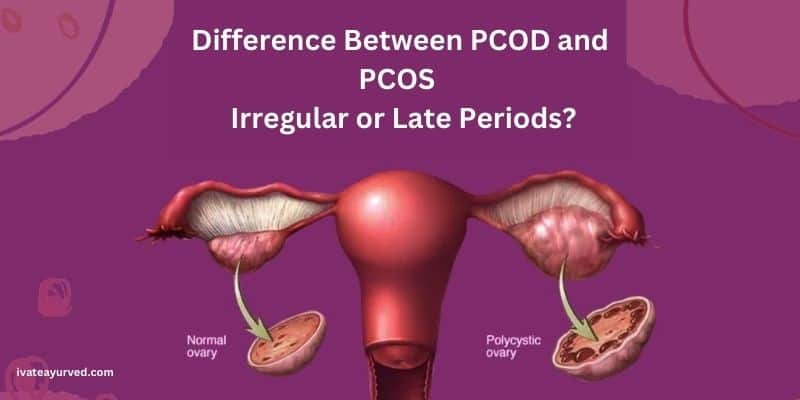PCOD vs PCOS: Differences, Causes, Problems, and Symptoms
PCOD and PCOS, is a condition that affects women’s ovaries. The reproductive organs produce estrogen hormones and progesterone to control the menstrual cycle; additionally, they release small amounts of male hormones such as androgens, relaxin, and inhibin.
Many women are mistakenly confused about PCOS and PCOD, using them interchangeably when trying to understand the distinction between them. Although both conditions share some similarities such as being related to the ovaries or causing hormonal disturbances, they are very distinct entities.
Let us examine the distinctions between these conditions more closely.
What is PCOD?
PCOD (Polycystic Ovarian Disease) is a condition in which the ovaries develop small cysts or follicles that may or may not contain eggs. The hormonal imbalance that causes this condition can lead to irregular periods, weight gain, acne, and excess hair growth. PCOD is generally considered to be a type of endocrine disorder that affects the ovaries.
Some of the most common PCOD symptoms include:
- Irregular periods: Women with PCOD may have irregular menstrual cycles, which can make it difficult to predict when their periods will occur.
- Ovarian cysts: Multiple small cysts can form on the ovaries due to hormonal imbalances, which is one of the primary characteristics of PCOD.
- Hormonal imbalances: PCOD can cause imbalances in the levels of various hormones in the body, such as insulin, testosterone, and estrogen.
- Acne: Women with PCOD may experience acne and other skin problems due to increased testosterone levels.
- Excess hair growth: PCOD can cause excess hair growth on the face, chin, chest, and other parts of the body due to high levels of androgens.
- Weight gain: Women with PCOD may find it more difficult to lose weight or may gain weight easily.
- Infertility: PCOD can interfere with ovulation, which can make it difficult to conceive.
It’s important to note that not all women with PCOD will experience all of these symptoms, and some women may have mild or no symptoms at all.
What is PCOS?
PCOS (Polycystic Ovary Syndrome) is a broader term that encompasses not only the ovarian cysts of PCOD but also a range of other symptoms and health concerns. PCOS is a hormonal disorder that affects not only the ovaries but also other hormone-producing organs in the body. In addition to ovarian cysts, PCOS may cause irregular periods, insulin resistance, weight gain, acne, excess hair growth, and infertility.
The specific symptoms and their severity can vary between individuals, but here are some of the most common ones:
- Irregular periods: PCOS can cause menstrual cycles that are irregular, infrequent, or absent. Some women may have very heavy periods while others have very light periods.
- Ovarian cysts: Multiple small cysts can form on the ovaries due to hormonal imbalances.
- Hormonal imbalances: PCOS can cause an imbalance in the levels of various hormones in the body, including testosterone, estrogen, and luteinizing hormone (LH).
- Acne: Increased testosterone levels can cause acne and other skin problems.
- Excess hair growth: PCOS can cause excess hair growth on the face, chin, chest, and other parts of the body due to high levels of androgens.
- Weight gain: Women with PCOS may find it more difficult to lose weight or may gain weight easily.
- Infertility: The hormonal imbalances caused by PCOS can interfere with ovulation and make it difficult to conceive.
- Fatigue: Women with PCOS may experience fatigue or low energy levels due to hormonal imbalances.
It’s important to note that not all women with PCOS will experience all of these symptoms, and some women may have mild or no symptoms at all.
Are PCOD & PCOS is same?
PCOS and PCOD are two related terms that are often used interchangeably to refer to a common endocrine disorder that affects women. However, they are not the same thing.
So while the two terms are related and have some overlapping symptoms, PCOD refers specifically to the presence of ovarian cysts while PCOS refers to a broader hormonal disorder that can include ovarian cysts and a range of other symptoms and health issues.
Here are some ways in which they differ:
- Ovarian cysts: PCOD is characterized by the presence of multiple small cysts on the ovaries, while ovarian cysts are only one of several possible symptoms of PCOS.
- Hormonal imbalances: Both conditions involve hormonal imbalances that can lead to irregular periods, acne, and excess hair growth. However, the specific hormones that are affected and the severity of the imbalance may differ between the two conditions.
- Insulin resistance: PCOS is often associated with insulin resistance, a condition in which the body becomes less responsive to insulin, leading to elevated blood sugar levels. PCOD may also be associated with insulin resistance, but it is less commonly seen in this condition.
- Other health concerns: PCOS is associated with a higher risk of certain health conditions, such as type 2 diabetes, high blood pressure, and heart disease, than PCOD. PCOS can also cause fertility problems, while fertility issues are less common in women with PCOD.
In summary, PCOD is primarily characterized by the presence of ovarian cysts, while PCOS is a broader hormonal disorder that can involve a range of symptoms and health issues beyond just ovarian cysts.
In both conditions – PCOD vs PCOS, Weight loss can help treat them. Exercising regularly, maintaining a healthy diet, and avoiding processed foods and junk food have all been known to be successful treatments for these conditions. The most effective way to deal with them is early diagnosis; consult a Gynecologist if you experience irregular periods, facial hair growth, or irregular periods on either side.
PCOD or PCOS issues in your Future Health
PCOD (Polycystic Ovary Disease) and PCOS (Polycystic Ovary Syndrome) can cause a range of health problems in the future if left untreated. Some of the potential complications associated with these conditions include:
- Infertility: The hormonal imbalances associated with PCOS and PCOD can interfere with ovulation and make it difficult to conceive.
- Diabetes: Women with PCOS and PCOD are at a higher risk of developing diabetes, particularly type 2 diabetes, due to insulin resistance.
- Heart disease: Women with PCOS and PCOD are at a higher risk of developing heart disease due to factors such as high blood pressure, high cholesterol, and insulin resistance.
- Endometrial cancer: Women with PCOS and PCOD may have a higher risk of developing endometrial cancer, particularly if they have irregular periods.
- Depression and anxiety: Women with PCOS and PCOD may be at a higher risk of developing depression and anxiety, which can impact their overall health and well-being.
It’s important to note that with proper diagnosis and treatment, many of these potential complications can be prevented or managed effectively. Women with PCOS and PCOD should work closely with their healthcare providers to manage their symptoms and reduce their risk of future health problems.
Does PCOD & PCOS impact Pregnancy?
PCOD (Polycystic Ovarian Disease) and PCOS (Polycystic Ovary Syndrome) can both have an impact on pregnancy in different ways:
PCOD: Women with PCOD may have trouble getting pregnant because the hormonal imbalances associated with the condition can interfere with ovulation. However, once pregnancy is achieved, the condition itself does not typically cause any significant problems during pregnancy. However, women with PCOD may be at a slightly higher risk of gestational diabetes and high blood pressure during pregnancy.
PCOS: Women with PCOS may also have difficulty getting pregnant due to irregular periods and hormonal imbalances that interfere with ovulation. Additionally, PCOS is associated with a higher risk of miscarriage and preterm birth. Women with PCOS who do become pregnant may be at higher risk for gestational diabetes, high blood pressure, and pre-eclampsia.
Both conditions can be managed during pregnancy with proper medical care and monitoring. Women with PCOD or PCOS who are planning to become pregnant should work closely with their healthcare providers to optimize their chances of a healthy pregnancy and delivery.




Harsh
Nice post. I learn something new and challenging on websites I stumbleupon every day. It will always be useful to read through articles from other writers and use a little something from other websites.
April 18, 2023 at 1:40 pm